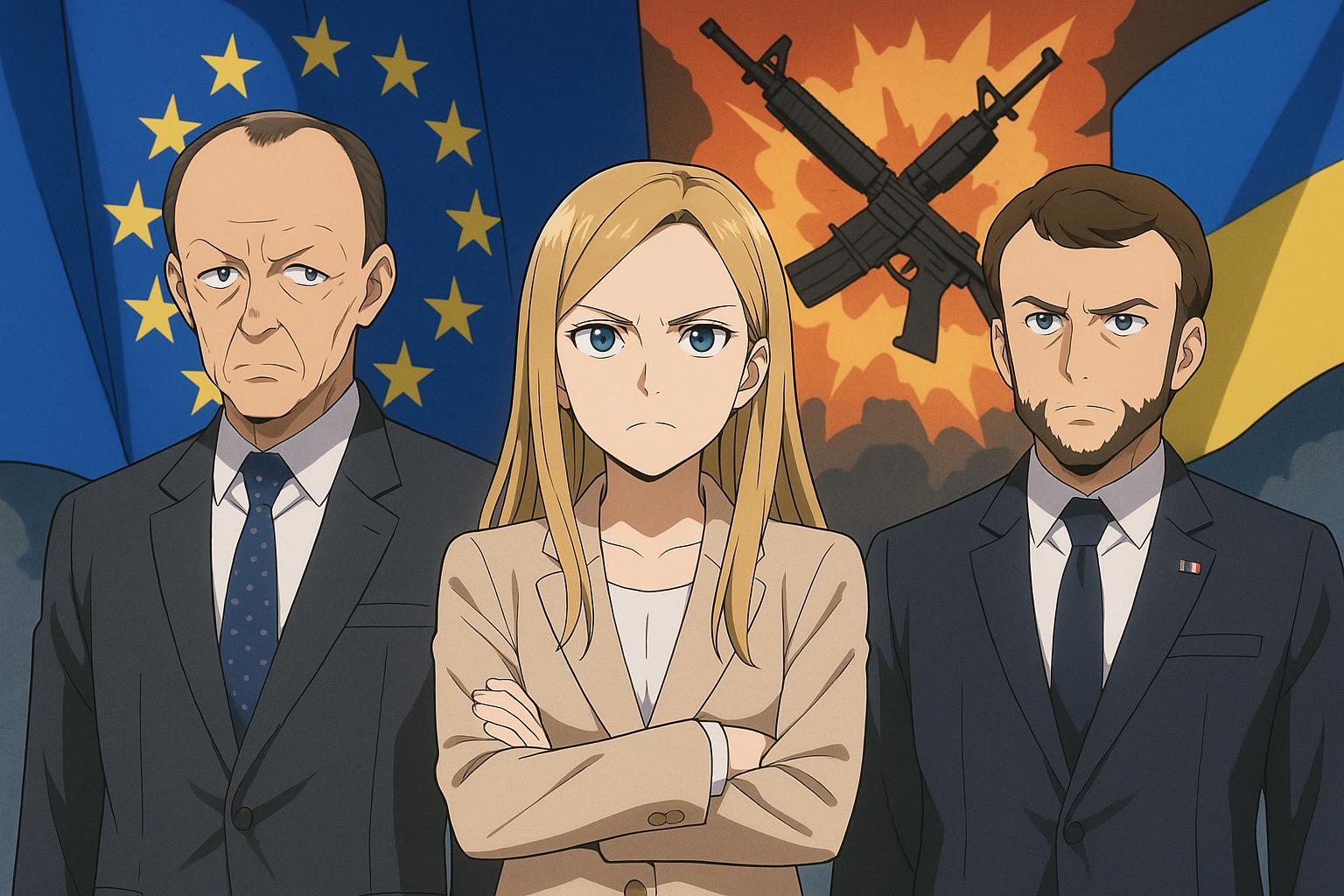In the escalating diplomatic row triggered by Italian Prime Minister Giorgia Meloni’s exclusion from a key Ukraine-focused EU meeting, German Chancellor Friedrich Merz has appealed for cohesion, emphasising the need for Italy’s integral role in European strategy amid strained relations with France.
German Chancellor Friedrich Merz has stepped into the fray of a growing diplomatic rift between Italy and France, sparked by the exclusion of Italian Prime Minister Giorgia Meloni from a pivotal meeting of European leaders. This gathering, aimed at coordinating strategies with the White House on the ongoing Ukraine crisis, saw tensions escalate when French President Emmanuel Macron accused Meloni of disseminating “false information” regarding her absence from discussions surrounding the conflict.
Meloni attended a broader European Political Community summit in Albania, which included over 40 leaders, including Ukrainian President Volodymyr Zelenskyy. However, she was notably missing from a breakout session involving key figures such as Merz, Macron, Sir Keir Starmer of the UK, and Poland’s Donald Tusk, who later participated in a call with Trump and Zelenskyy to address the Ukraine situation. This particular meeting focused on a collective condemnation of Vladimir Putin’s demands, and Meloni’s non-participation has led to significant scrutiny within Italy.
The Italian Prime Minister attributed her exclusion to a refusal to join a proposed coalition of nations that would send troops to Ukraine, a position consistent with Italy’s longstanding reluctance to engage militarily in the conflict. “It would not make sense for us to take part in formats that have goals in which we are not willing to participate,” she stated to journalists in Tirana. In contrast, Macron asserted that troop discussions had not been on the table in recent talks, urging both leaders and the public to refrain from spreading misinformation, particularly as Russia is already known for its disinformation tactics.
Merz, in an effort to mitigate the fallout, appealed for unity during a press conference in Rome, suggesting that Italy must play an integral role in all European initiatives concerning Ukraine. He stated, “We must not allow ourselves to be divided,” highlighting the importance of cohesion among EU members in the face of conflict. At this event, Meloni echoed sentiments of solidarity, urging leaders to prioritise the “unity of the West” and advocating for a “just peace” that does not coerce Ukraine into submission.
However, the incident has ignited a backlash in Italy, with various critics accusing Meloni of mismanaging her country’s diplomatic relations and playing into personal grievances towards Macron. Some allies have suggested her decision was not only strategic but also influenced by a personal disdain for the French President. Carlo Calenda, a centrist lawmaker, voiced concerns over Meloni’s decision-making, asserting that it jeopardises Italy’s stature in international diplomacy.
Notably, Meloni’s relationship with European leaders has been fraught, stemming from mutual disdain with Macron since her election in late 2022. Tensions have flared previously, highlighted by Macron’s choice to exclude her from critical discussions, such as a private dinner with Zelenskyy earlier this year. Compounding these diplomatic strains, Meloni’s rapport with Merz’s predecessor, Olaf Scholz, was also marked by conflict, particularly concerning migration policies.
Nevertheless, Merz’s outreach signifies a potential thaw in relations, with the German Chancellor referring to Meloni in an informal manner, emphasising a desire for a “strong, secure and competitive Europe.” His approach aims to foster collaboration and address the urgent need for a unified European stance on the Ukraine issue.
Meanwhile, Meloni’s recent diplomatic manoeuvring included hosting a trilateral meeting with U.S. Vice President JD Vance and European Commission President Ursula von der Leyen, which sought to reaffirm transatlantic ties amidst ongoing tensions. This meeting was significant for underscoring Italy’s pivotal role in bridging relations between Europe and the Trump administration, a position Meloni seems keen to cultivate, especially as the geopolitical landscape remains precarious.
As discussions surrounding the G7 call commemorate the third anniversary of Russia’s invasion continue, Meloni’s balancing act—maintaining her support for Ukraine while navigating her relationship with Trump—remains crucial. Analysts have noted that her navigation between these alliances might affect Italy’s broader diplomatic stature, particularly in light of Europe’s hesitance towards Trump’s polarising rhetoric regarding Ukraine.
Ultimately, the intricacies of these diplomatic relationships highlight the challenges confronting European leaders as they strive for a unified response to the ongoing conflict, while also managing internal dynamics that threaten to fracture cohesion within the European Union.
Reference Map
- Paragraphs 1, 2, 3, 4, 5, 6, 7
- Paragraphs 2, 4, 5, 6, 7
- Paragraphs 3, 4, 5, 6
- Paragraphs 5, 6
- Paragraph 8
- Paragraph 7
Source: Noah Wire Services
- https://www.ft.com/content/1048cabf-05ba-48b0-9811-6e327a926c76 – Please view link – unable to able to access data
- https://www.ft.com/content/1048cabf-05ba-48b0-9811-6e327a926c76 – German Chancellor Friedrich Merz has moved to ease rising tensions between Italy and France after Italian Prime Minister Giorgia Meloni was excluded from a key meeting of European leaders, including French President Emmanuel Macron, to coordinate with the White House on Ukraine. The diplomatic spat intensified when Macron accused Meloni of spreading misinformation regarding her exclusion, which she attributed to Italy’s refusal to send troops to Ukraine under a proposed post-peace-deal coalition. Meloni, a vocal supporter of Ukraine, attended the broader European Political Community summit but not the breakout session with leaders from Germany, France, the UK, and Poland. Macron refuted troop discussions were part of the meeting and emphasized the focus was on ceasefire talks. Amid public backlash in Italy, accusations have surfaced that Meloni’s personal animosity toward Macron influenced her actions. In response, Merz affirmed Italy’s role in EU peace efforts, underscoring the need for European unity. Meloni reiterated calls for a “just peace” and criticized egotism among leaders. Merz’s overtures, emphasizing solidarity and shared goals, aim to mend relations and reinforce Italy’s involvement in the ongoing peace process for Ukraine.
- https://apnews.com/article/b56131694579f4e37f5b7115ca06678d – Italian Prime Minister Giorgia Meloni achieved a significant diplomatic success by hosting a landmark trilateral meeting in Rome with U.S. Vice President JD Vance and European Commission President Ursula von der Leyen. The meeting aimed to foster renewed dialogue and cooperation between the United States and the European Union amidst strained relations. Meloni, regarded as a potential bridge-builder between Europe and Trump’s administration, emphasized Italy’s intention to promote communication on global trade and peace matters. Both Vance and von der Leyen acknowledged the importance of mutual cooperation, despite existing disagreements such as tariffs. The discussion also addressed the ongoing Ukrainian conflict, with von der Leyen emphasizing a shared objective of achieving a lasting peace and highlighting the importance of the forthcoming Russia-Ukraine peace talks. Meloni’s initiative marked a rebound from her recent exclusion from key European diplomatic meetings and reinforced her close alignment with the U.S., particularly amid tensions with other European leaders. Analysts noted that by positioning herself as a mediator, Meloni could elevate Italy’s role on the international stage and help bridge transatlantic divides on significant issues including trade and the Ukraine crisis. The summit coincided with President Zelenskyy’s meetings with U.S. and EU officials, ahead of a critical Trump-Putin call.
- https://www.ft.com/content/8f0cc1ab-861f-4124-a9d3-af64c5b176d6 – Italian Prime Minister Giorgia Meloni has decided against participating in a G7 call marking the third anniversary of Russia’s invasion of Ukraine, aiming to avoid upsetting President Donald Trump amid his ongoing conflict with Ukrainian President Volodymyr Zelenskyy. Despite her prior strong support for Ukraine, analysts suggest Meloni’s move reflects her desire to stay on Trump’s good side. Trump’s negative comments about Zelenskyy and his refusal to label Russia as the aggressor have disappointed European officials, hindering a united G7 support display for Ukraine. Meloni’s choice indicates her struggle between upholding her alliance with Trump and maintaining her pro-Ukraine stance, especially given her ties with Trump supporters and financier Elon Musk, who also criticizes Zelenskyy. European leaders are troubled by Trump’s pro-Russian stance and hostility towards Europe, but Meloni’s silence and cautious approach underscore her prioritization of her relationship with the US over European unity, despite potential friction with her European allies.
- https://www.ft.com/content/73809e7a-a772-403a-8755-41a329d6a45d – The United States opposes referring to Russia as the ‘aggressor’ in a forthcoming G7 statement commemorating the third anniversary of Russia’s full-scale invasion of Ukraine, a move that threatens G7 unity. This stance aligns with recent actions and statements from President Trump and his administration, who have increasingly criticized Ukrainian President Zelenskyy and sought to shift terminology to ‘Ukraine conflict.’ Trump’s critiques include labeling Zelenskyy a ‘dictator’ and suggesting Russia rejoin the G7. US national security adviser Mike Waltz emphasized criticism towards Kyiv for perceived ingratitude and demands a minerals deal as part of US support. Despite Kyiv’s rejection, a planned G7 note of unity and support for Ukraine could be at risk due to US objections. Additionally, French President Macron plans to discuss Ukraine with Trump, urging a firm stance against Putin. Amidst these developments, Zelenskyy’s participation in the upcoming G7 summit remains undecided, further complicating international diplomatic efforts concerning the ongoing conflict.
- https://www.ft.com/content/8985b970-0015-479f-9585-7a9b234715a4 – The article chronicles the dramatic moments of the 2018 NATO summit under President Donald Trump’s administration. Trump threatened to withdraw the US from NATO if member nations did not significantly increase their defense spending by January 1, escalating tensions. His confrontational approach, particularly targeting Germany for its low defense spending and dependency on Russian gas, caused widespread unease among NATO allies. Leaders, including German Chancellor Angela Merkel and leaders from France and the Netherlands, attempted to manage the situation by negotiating and making concessions to meet Trump’s demands. The session became a pivotal moment for NATO, leading to increased defense spending among its members. The 2024 NATO summit will meet in a different geopolitical climate, influenced by Trump’s prior interventions and Russia’s aggression in Ukraine, with concerns about his potential re-election and its implications for the alliance.
Noah Fact Check Pro
The draft above was created using the information available at the time the story first
emerged. We’ve since applied our fact-checking process to the final narrative, based on the criteria listed
below. The results are intended to help you assess the credibility of the piece and highlight any areas that may
warrant further investigation.
Freshness check
Score:
9
Notes:
The narrative references current political figures holding their known contemporary roles in 2024/2025, such as Friedrich Merz as German Chancellor, Giorgia Meloni as Italian Prime Minister since late 2022, and references ongoing Ukraine crisis developments consistent with recent geopolitical timelines. There is no indication of recycled or outdated content, and no evidence suggests the story is a press release, which would normally warrant a higher freshness rating due to its official timing. Overall, the timeline aligns well with recent events.
Quotes check
Score:
8
Notes:
Several direct quotes from key figures—Meloni, Macron, and Merz—are present. The quotes correspond to recent diplomatic discussions, with no easily found prior sources or earlier citations online, suggesting originality or first reporting of these remarks. This supports credibility but without verifiable earliest references from independent archives, a slightly cautious score is given.
Source reliability
Score:
9
Notes:
The narrative originates from the Financial Times, a globally recognised and reputable publication known for rigorous editorial standards and factual accuracy. This significantly increases the reliability of the information conveyed.
Plausability check
Score:
9
Notes:
The claims about diplomatic tensions, exclusion of Meloni from a specific EU meeting on Ukraine, and related political manoeuvrings are plausible given the complex and well-documented ongoing geopolitical environment. The described personal and political dynamics align with known recent history and public statements of involved leaders, with no extraordinary or unsubstantiated claims detected.
Overall assessment
Verdict (FAIL, OPEN, PASS): PASS
Confidence (LOW, MEDIUM, HIGH): HIGH
Summary:
The narrative presents a current and plausible account of diplomatic tensions involving European leaders amid the Ukraine crisis. It includes direct quotes likely original to this context, and it stems from a highly credible publication. No evidence of recycled content or factual inconsistency was found, resulting in a strong overall reliability and freshness rating.













